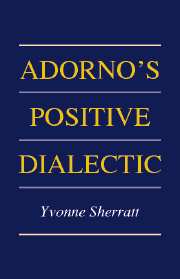Book contents
- Frontmatter
- Contents
- Preface
- Abbreviations
- Adorno's Positive Dialectic
- General Introduction
- PRELUDE TO ADORNO'S POSITIVE DIALECTIC
- Prelude I: Adorno's Intellectual Tradition: German Philosophy
- Prelude II: Adorno's Intellectual Tradition: Sigmund Freud
- ADORNO'S POSITIVE DIALECTIC: INTRODUCTION
- PART I NEGATIVE THESIS: THE DECLINE OF ENLIGHTENMENT
- PART II POSITIVE THESIS: THE REDEMPTION OF ENLIGHTENMENT
- Bibliography
- Index
PRELUDE TO ADORNO'S POSITIVE DIALECTIC
Published online by Cambridge University Press: 10 August 2009
- Frontmatter
- Contents
- Preface
- Abbreviations
- Adorno's Positive Dialectic
- General Introduction
- PRELUDE TO ADORNO'S POSITIVE DIALECTIC
- Prelude I: Adorno's Intellectual Tradition: German Philosophy
- Prelude II: Adorno's Intellectual Tradition: Sigmund Freud
- ADORNO'S POSITIVE DIALECTIC: INTRODUCTION
- PART I NEGATIVE THESIS: THE DECLINE OF ENLIGHTENMENT
- PART II POSITIVE THESIS: THE REDEMPTION OF ENLIGHTENMENT
- Bibliography
- Index
Summary
Our Prelude seeks to introduce Adorno to the philosophical community, to German philosophers less familiar with twentieth-century currents and those from the Anglo-American tradition with a curiosity about this well-known and controversial figure. Possibly the Prelude will be of interest also to Adorno scholars, as it will contextualise my perception of Adorno in relation to older currents of thought.
To introduce Adorno's intellectual project I have had to decide upon a starting point: this was not easy, for Adorno was well versed in many philosophical traditions. He was well read in the classics, Judeo-Christian thought, and many other deep historical layers of Western philosophy. (All of these impacted upon his writing – for instance, in the pun on Aristotle in his title Minima Moralia.) For two reasons I have decided to begin with Adorno's origins in Kant and post-Kantian German philosophy. First, Kantian and post-Kantian philosophy are the main strands, besides Freud, influencing our central text, Dialectic of Enlightenment. Second, Kant represents a key point in the building of two distinct disciplinary approaches to philosophy: the moment when the European and Anglo-American traditions divide. It is therefore the last point of connection between these two schools and hence the place to begin to introduce Adorno to them both.
Our prelude consists of two sections. In Prelude I, we show the origins of Dialectic of Enlightenment in German philosophy.
- Type
- Chapter
- Information
- Adorno's Positive Dialectic , pp. 23Publisher: Cambridge University PressPrint publication year: 2002



